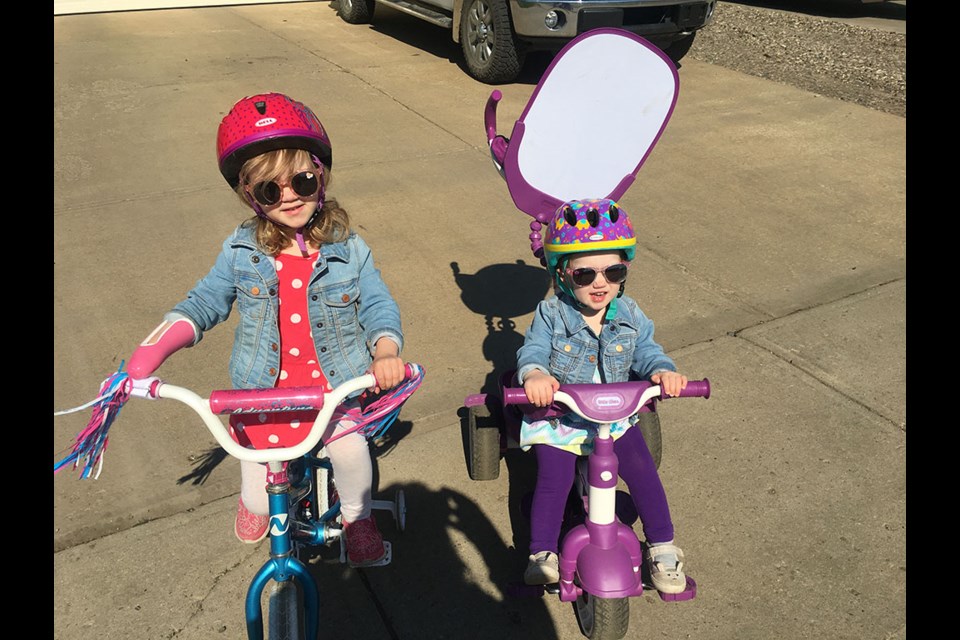Emma Grobbink might be young, but she has already become a regular at the War Amps Western Canada Child Amputee seminar.
Emma, the four-year-old daughter of Mike and Jessica Grobbink of Estevan, was in Winnipeg with her mother from Aug. 24 to 26 for this year’s seminar. It’s the third time she has been to the conference.
Emma was born without part of her right hand. She has the thumb, but she’s missing fingers, which makes it difficult to grip things.
“She always really enjoys going and getting to hear all the other kids and getting to interact with them,” said Jessica Grobbink.
The conventions are an opportunity to gain information and keep in touch with some of the other amputees they have met at the previous seminars.
“One of the things about being an amputee is that everybody’s situation is unique, in that nobody needs exactly the same thing,” said Jessica. “There are always new developments and new information, and it’s a great weekend to get together and share all of it.”
The conferences have proven to be a great source of information. While attending a previous convention, Jessica learned about a recreational device for her daughter, allowing Emma to ride a bicycle. Emma previously couldn’t properly grip the handlebars.
“I’d seen a similar device in one of the War Amps communications. They send out a quarterly newsletter,” said Jessica. “It was something that attaches to the right side of the bike on her handlebars. It allows her to properly grip and steer, which allows her to ride her bike, which is exactly what any four-year-old would want to do.”
There is a bit of a process needed to get a recreational device made, but the War Amps can give recommendations on the devices.
It usually starts by approaching a general practitioner, and then going through an occupational or physical therapist. Then applicants are referred to the Wascana Rehabilitation Centre.
“From there, they have to take fittings and measurements and stuff, so it involves a couple of trips back and forth to Regina, and then the end result is customizable device that’s made perfectly just for Emma so she can ride her bike,” said Jessica.
The War Amps helps cover the cost of the device, which would be expensive to purchase. It has given Emma the freedom to ride a bicycle on her own.
It’s the only device Emma has needed thus far. Her mother describes Emma as resilient and clever at figuring out how to do things without needing assistance.
There are a couple of things she needs help with, but there isn’t anything she can’t do.
“As she gets older, there will probably be more devices or daily living aids that she might need to use, especially as she gets into different sports and things like that,” said Jessica.
At this year’s convention in Winnipeg, Emma met another little girl in Regina who is also a partial hand amputee. They spent some time together and really enjoyed visiting.
A highlight of each seminar is the involvement of junior counsellors. Usually the War Amps tries to match up young children with young people in their teens who have a similar level of amputation, so they can spend time together, play and become comfortable with each other.
“A lot of times the parents of the junior counsellors are there as well, so for myself as a parent, then I have the opportunity to ask any questions I might have to parents of junior counsellors,” said Jessica. “Obviously they’re 10-15 years ahead of where Emma is, so they’ve already gone down this road, and they’ve seen some of the similar situations that Emma has or will encounter, so they’re in a good position to give advice or recommendations on what you can do and who you need to speak to.”
Jessica expects they will continue to attend these conferences, especially since Emma always enjoys them.
The War Amps was started by amputee veterans returning from the First World War to help each other adapt to their new reality and advocate for seriously disabled veterans.
With a philosophy of “amputees helping amputees,” they welcomed the next generation of war amputees following the Second World War and established the Key Tag Service to gain meaningful employment and provide a service to the public. Later, recognizing that their experience could help others, they developed programs to serve all amputees, including children.



